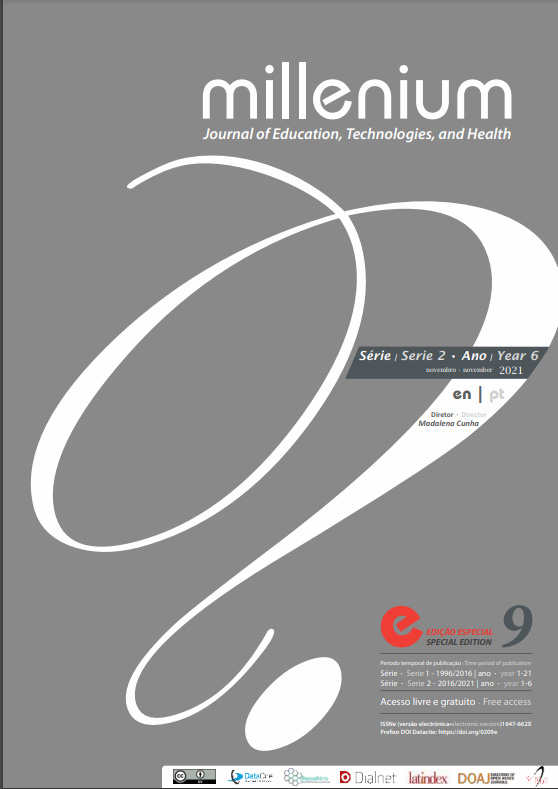Emotional intelligence in seniors enrolled in senior universities
DOI:
https://doi.org/10.29352/mill029e.25335Keywords:
emotional intelligence, aged, senior collegeAbstract
Introduction: Emotional Intelligence (EI) is a construct that has been considered the most responsible for the success or failure of human beings, highlighting also the contributions of Senior Universities in its development.
Objective: Evaluate emotional intelligence of seniors enrolled in Senior Universities and verify associations with sociodemographic variables.
Methods: Cross-sectional, descriptive/correlational and quantitative study, which used a non-probabilistic convenience sample, consisting of 122 elderly people enrolled in the Senior University of the Center of Portugal. The measurement instrument used included a sociodemographic data sheet and an Emotional Intelligence Measurement Scale (EIM).
Results: Mainly female population (58.1%), with an average age of 62.3 years, married (62.3%), with the 9th grade of schooling (40.3%), retired (72.1%) and with meager economic resources. They present high levels in the various dimensions of EI (>60%), with emphasis on self-motivation, empathy and sociability. Conversely, the lowest values refer to self-awareness and self-control. The association between variables did not show significant statistical significance (p>0.05), however, the mean values suggest that EI (in most dimensions) is higher in men, in older individuals (>70 years), married, with 6th year of schooling, with lower monthly income and those most dissatisfied with the value of the pension.
Conclusion: The study reinforces the relevance and legitimacy of research in the area of emotional intelligence of the elderly towards the implementation of programs to promote EI, with a special focus on self-awareness and self-control.
Downloads
References
Almeida, A., Mendes, L., Castro, L. (2017) Educação na Terceira Idade: contribuição das UTIS na qualidade devida dos seus frequentadores. Internet Latent Corpus Journal,7(1), 113-125. http://revistas.ua.pt//index.php/ilcj/index
Andrade, A., Duarte, J., Cruz, C., Albuquerque, C., Chaves, C. (2019). Inteligência emocional em Idosos Portugueses. Rev INFAD de Psicologia, 4(1): 331-338 http://www.infad.eu/RevistaINFAD/OJS/index.php/IJODAEP/article/view/1566
Andrade, A., Martins, R., Duarte, J. & Madureira, A. (2015). Validation of Emotional Intelligence Measure (MIE) for the Portuguese population. Atención Primaria, 46 (especial congresso), 92- 100. doi: 10.1016/S0212-6567(14)70073-3
Boazinha, I. (2014). Atitudes e práticas na gestão de talentos e inteligência emocional: Suas interações. [Dissertação de Mestrado em Psicologia não publicada].Universidade de Évora. Évora. https://dspace.uevora.pt/rdpc/bitstream/10174/10935/1/Atitudes%20e%20Pr%C3%A1ticas%20na%20Gest%C3%A3o%20de%20Talentos%20e%20Intelig%C3%AAncia%20Emocional.pdf
Campos, S., Martins, R., Martins, C., Chaves, C., Duarte, J. (2016). Emotional Inteligence and Quality of life in Specal Education Teachers. Journal of Teaching and Education. ISSN: 2165-6266 :05(01):681-688 (2016
Candeias, A. A., & Canhoto, M. (2019). Estudos de Inteligência emocional em contextos profissionais com o IEVQ: Metanálise dos trabalhos de adaptação à população portuguesa. In, A.A. Candeias, (Coord.). Desenvolvimento ao longo da vida: Aprendizagem, Bem-estar e Inclusão (Cap. 11, pp. 190-203). Évora: Universidade de Évora. http://hdl.handle.net/10174/27430
Feitor, F. D.S. (2018). Aprender a ser: As Universidades Seniores na Vida das Pessoas de Idade Avançada. [Dissertação de Mestrado em Ciências da Educação, não publicada]. Faculdade de Psicologia e Ciências da Educação. Universidade de Coimbra. https://estudogeral.uc.pt/bitstream/10316/85659/1/Relat%C3%B3rio__Filipa%20Feitor.pdf
Fragoso, V. (2017). Escolha e decisão: educação emocional na senioridade. In J. Alves & A. Neto (Eds.), Decisão percursos e contextos (pp. 397- 403). Vila Nova de Gaia. DOI:10.17060/ijodaep.2019.n1.v4.1566
Gaspar, D., & Martins, R. (2016). Inteligência Emocional em ALunos que frequentam a Universidade Sénior. Dissertação de Mestrado em Psicologia. Coimbra: Instituto Superior Miguel Torga.
Goleman, D. (2012). Trabalhar com inteligência emocional. Lisboa: temas e Debates.
Instituto Nacional de Estatística. (2017). Projeções de população residente 2015-2080. Recuperado:https://www.ine.pt/xportal/xmain?xpid=INE&xpgid=ine_destaques&DESTAQUESdest_boui=277695619&DESTAQUESmodo=2&xlang=pt
Loureiro, R., Martins, R., Bernardo, J., & Batista, S. (2021). Efficacy of Rehabilitation on Mobility, Prevention and Reduction of the Fall’s Risk in Parkinson’s Patients. New Trends in Qualitative Research, 8, 163–171. https://doi.org/10.36367/ntqr.8.2021.163-171
Nowack, K. (2017). Sleep, emotional intelligence, and interpersonal effectiveness: Natural bedfellows. Consulting Psychology Journal: Practice and Research, 69(2), 66–79.https://doi.org/10.1037/cpb0000077
Silva, D.C.M. (2015). Inteligência Emocional e Estilos de Coping: estudo exploratório numa população de idosos. Dissertação de Mestrado em Gerontologia Social. Porto. Instituto Superior de Serviço Social do Porto. https://comum.rcaap.pt/bitstream/10400.26/10909/1/Diana%20Catarina%20Martins%20da%20Silva.pdf
Woyciekoski, C., & Hutz, C. S. (2009). Inteligência emocional: teoria, pesquisa, medida, aplicações e controvérsias. Psicologia: Reflexão e Crítica, 22(1), 1-11. https://dx.doi.org/10.1590/S0102-79722009000100002
Downloads
Published
How to Cite
Issue
Section
License

This work is licensed under a Creative Commons Attribution 4.0 International License.
Authors who submit proposals for this journal agree to the following terms:
a) Articles are published under the Licença Creative Commons (CC BY 4.0), in full open-access, without any cost or fees of any kind to the author or the reader;
b) The authors retain copyright and grant the journal right of first publication, allowing the free sharing of work, provided it is correctly attributed the authorship and initial publication in this journal;
c) The authors are permitted to take on additional contracts separately for non-exclusive distribution of the version of the work published in this journal (eg, post it to an institutional repository or as a book), with an acknowledgment of its initial publication in this journal;
d) Authors are permitted and encouraged to publish and distribute their work online (eg, in institutional repositories or on their website) as it can lead to productive exchanges, as well as increase the impact and citation of published work
Documents required for submission
Article template (Editable format)





